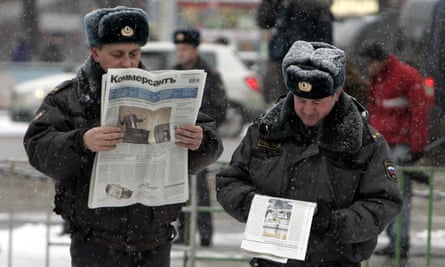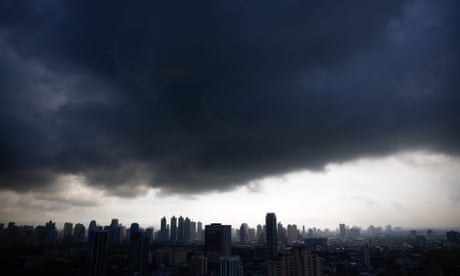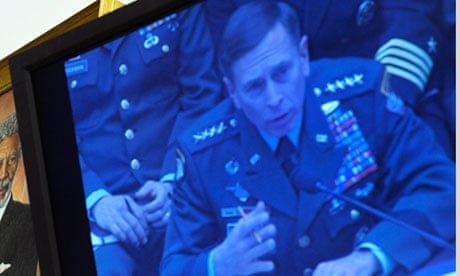Mount Rushmore National Memorial is een beroemd Amerikaans bedevaartsoord, waar vier reusachtige hoofden van vier imperialistische Amerikaanse presidenten met drilboren uit een berg zijn gehouwen. Deze titanenklus stond onder leiding van beeldhouwer Gutzon Borglum, een uitgesproken racist en antisemiet die in 1930 een veelzeggende definitie van Amerikaanse ‘Bigness,’ gaf. De door hem bewonderde 'Grootheid' is die van de imperium-bouwer, waarbij het kolossale moet imponeren en intimideren. Borglum zelf zei er dit over:
Colossal art has [a] value — human and soul-stirring — that should be incorporated permanently in all National expression — consciously and deliberately in scale with its importance [and] with the people whose lives it expresses.
De beeldhouwer vertelde ooit de volgende kenmerkende anecdote: ‘Some few years ago, a sculptor visited me who showed me the head of a pin, on which he had carved the head of a president. Quite apart from my feelings regarding the purpose, the meaninglessness of this,’ begon Borglum na te denken over ‘bigness’ en ‘[i]n thinking of this, I realized how the whole process of life in its healthy form [is expansive] in character,’ aangezien ‘great mass, has a greater emotional effect upon the observer than quality of form; that quality of form (when it is understood) affects the mind; volume shocks the nerve or soul-centers and is emotional in its effect.’
Ik verzoek u dit citaat nog eens te lezen, want hier wordt het kenmerk bij uitstek van de Verenigde Staten geformuleerd. Borglum's groteske beelden typeren de grootheidswaan van de Amerikaanse beschaving. Groot betekent volgens de nationale ideologie tegelijkertijd 'groots, gezond, expansief.' In die hoedanigheid vertegenwoordigt het de waarheid. Klein daarentegen betekent ongezond, het is niet ‘expansief’ en daardoor eenvoudigweg ‘zinloos.’ Het kleine overdondert de emoties onvoldoende, aangezien ‘het volume het zenuwgestel’ geenszins 'schokt.' Nogmaals Borglum:
A monument's dimensions should be determined by the importance to civilization of the events commemorated… We are cool-headedly, clear-mindedly setting down a few crucial, epochal facts regarding the accomplishments of the Old World radicals who shook the shackles of oppression from their light feet and fled despotism to people a continent; who built an empire and rewrote the philosophy of freedom and compelled the world to accept its wiser, happier forms of government.
Groot, Groter, Grootst! Shock and Awe, 'volume shocks the nerve or soul-centers,’ en kan 'de wereld dwingen' deze superieure 'vormen' te 'accepteren.' Borglum:
We believe a nation's memorial should, like Washington, Jefferson, Lincoln, and Roosevelt, have a serenity, a nobility, a power that reflects the gods who inspired them and suggests the gods they have become.
Maar deze 20 meter hoge uitbeelding van 'sereniteit, aristocratie' en van 'kracht die de goden weerspiegelt,' symboliseert tevens de gewelddadige onderwerping van de mens en de natuur aan grote leiders die geportretteerd worden als 'goden,' zoals de farao's millennia geleden. Ook op Mount Rushmore manifesteert het goddelijke zich door vier buiten-proportionele, uit graniet gehouwen, hoofden. De top van Mount Rushmore werd ervoor verwoest zodat de doorsnee ‘Amerikaan’ tot het einde der dagen de ode aan zijn leiders, en vanzelfsprekend aan zichzelf, kan verheerlijken. Dat de oorspronkelijke bewoners, de Indianen, bijna geheel werden uitgeroeid en de weinige overlevenden in concentratiekampen zijn bijeengedreven, speelt in deze 'grootse' mythe geen enkele rol. Zo beweerde de jurist en bestseller-auteur Geert Mak nog in 2012 dat ‘[o]rde, evenwicht tussen de verschillende machten, binnen Amerika (hij bedoelt de VS. svh) en ook in de rest van de wereld’ het ‘doel’ was van president Teddy Roosevelt. ‘De Amerikaanse individuele vrijheid hoefde daarbij niet in het gedrang te komen, integendeel, het ging hem juist om de bescherming van die vrijheid.’ In werkelijkheid was Theodore Roosevelt een uitgesproken racist zodra het onder andere de Indiaanse volkeren betrof voor wie absoluut geen plaats was in het ‘Amerika’ van het begin van de twintigste eeuw, zoals bleek uit zijn opmerking dat ‘braakliggende ruimtes’ niet
gereserveerd moeten worden voor het gebruik van verspreid levende primitieve stammen, wier leven slechts een paar graden minder betekenisloos, smerig, en meedogenloos is dan dat van de wilde beesten met wie ze het gebied delen.
Zij moesten worden uitgeroeid om ruimte te maken voor witte Europese kolonisten en voor hun ‘global solutions to locally produced “overpopulation” problems.’ De Amerikaanse historicus Daniel J. Castellano schreef in het essay Rooseveltian Imperialism (2012):
The imperialist ideology of Theodore Roosevelt was in no small part motivated by a belief in the superiority of the race and civilization of Anglo-Saxon peoples, as articulated in his Autobiography and other writings. Many of the tropes (banaliteiten. svh) and prejudices articulated under this overtly racist theoretical framework have persisted today among American commentators when discussing 'developing nations' as squabbling, 'immature democracies,' full of un-industrious, corrupt, or cowardly leaders. Perhaps a recognition of the racist origins of these attitudes will give us pause in applying them instinctively in a neocolonialist context. Racism and nationalism are not as far apart as we would like to believe...
In his private correspondence, Roosevelt confessed to having a 'taste for ethnic contests,' and he believed these were necessary so that the civilized nations should establish themselves over the barbaric nations. The great powers of the world had a twofold responsibility to suppress 'savagery and barbarism' and 'to help those who are struggling toward civilization.' In Roosevelt's view, the expansion of the 'civilized' races was essential to world peace; otherwise 'warlike barbarians' such as the Turks and Sudanese Mahdists would gain ground, causing 'endless war.' The decrease in foreign wars at the turn of the century was 'due solely to the power of the mighty civilized races which have not lost the fighting instinct, and which by their expansion are gradually bringing peace to the red wastes where the barbarian peoples of the world hold sway.' Modern imperialism, like that of ancient Rome, is identified with the promotion of peace throughout the world,
Desondanks meende Teddy Roosevelt dat:
Ethnic contests, whether they took the form of military conquest or economic penetration, not only protected backward peoples from self-destructive warfare, but also served to 'prevent the higher races from losing their nobler traits and from being overwhelmed by the lower races.' Roosevelt clearly saw the less civilized peoples as a threat to European and North American culture. By asserting and promoting Western culture aggressively, the West protected its own future against barbarian conquest. Active participation in ethnic contests forced Westerners to exercise their 'nobler traits,' which could be lost if they were conquered or assimilated by intermarriage.
http://www.arcaneknowledge.org/histpoli/roosevelt.htm
To Theodore Roosevelt, the 'most ultimately righteous of all wars is a war with savages, though it is apt to be also the most terrible and inhuman,' but no matter, because it was 'idle to apply to savages the rules of international morality which obtain between stable and cultured communities...' Not that Roosevelt went 'so far as to think that the only good Indians are dead Indians, but I believe nine out of ten are, and I shouldn't inquire too closely into the case of the tenth.’
Ik beklemtoon dit nog eens omdat Roosevelt’s begrip ‘civilisatie’ nog eens benadrukt dat de VS het sluitstuk is van de Europese cultuur. Tussen die twee — cultuur en civilisatie — bestaat een scherp onderscheid. Zo wees de Frans historicus Amaury de Riencourt in zijn opzienbarende boek The Coming Ceasars (1957):
Civilization aims at the gradual standardization of increasingly large masses of men within a rigidly mechanical framework — masses of ‘common men’ who think alike, feel alike, thrive on conformism, are willing to bow to vast bureaucratic structures, and in whom the social instinct predominates over that of the creative individual. It could be said metaphorically that cultures are the systoles (samentrekking. svh) and civilizations the diastoles (ontspanning. svh) of human evolution, relaying each other endlessly, the pulsating heartbeats of history.
Het ‘creatieve individu’ kan onmogelijk in een ‘civilisatie’ gedijen. Alleen in een ‘cultuur’ kan het tot wasdom komen. Riencourt attendeert ons erop dat beide:
do not coincide in time but follow each other during the life span of a particular human society: each culture engenders (verwekt. svh) its own civilization.
Their definition springs from their allotted task in history. Culture predominates in young societies awakening to life, grows like a young organism endowed with exuberant vitality, and represents a new world outlook. It implies original creation of new values, of new religious symbols and artistic styles, of new intellectual and spiritual structures, new sciences, new legislations, new moral codes. It emphasizes the individual rather than society, original creation rather than preservation and duplication, prototypes rather than mass production, an aesthetic outlook on life rather than an ethical one. Culture is essentially trailblazing (baanbrekend. svh).
Civilization, on the other hand, represents the crystallization on a gigantic scale of the preceding culture's deepest and greatest thoughts and styles, living on the petrified forms created by the parent culture, basically uncreative, culturally sterile, but efficient in its mass organization, practical and ethical, spreading over large surfaces of the globe, finally ending in a universal state under the sway of a Caesarian ruler: India’s Asoka, China’s Shih Huang-ti, Egypt’s Thutmose III, Babylon’s Hammurabi, pre-Columbian Peru’s Inca Roka, Mexico’s Aztec emperor Itzcoatl, Islam’s Turkish sultans, and Rome’s Caesars who organized under their personal rules the universal societies toward which all the higher cultures tend when they pass into civilizations. Our coming Caesars, therefore, have to be seen in the light of this profound and recurrent urge for a worldwide empire in which the compelling desire for unity, peace, and the preservation of traditional values plays a predominant part.
Hoe weinig Geert Mak begrijpt van de geschiedenis bleek wederom uit Vrij Nederland van zaterdag 3 november 2012, waarin Nederlands ‘populairste geschiedenisleraar’ met een niet geringe pedanterie verklaarde dat ‘de Verlichting is bedacht in Europa, maar Amerika heeft het uitgevoerd, als real life experiment.’ Daarmee gaf mijn oude vriend Geert te kennen niet te beseffen dat, in de woorden van Riencourt:
Hun hele werkzame leven lang hebben mijn mainstream-collega’s niet beseft dat zij getuige waren van het steeds sneller ineenstorten van ‘de westerse cultuur’ die plaats maakte voor de verstarde ‘westerse ‘civilisatie.’ Dat mijn geschoolde generatiegenoten in feite een te verwaarlozen voetnoot van de westerse beschaving vertegenwoordigen, drong meer dan een halve eeuw absoluut niet tot mijn oude vrienden door. Voor mij getuigde dit van een verbijsterend autisme van de geprivilegieerden die zichzelf zagen als ‘urban elites,’ maar die in wezen niets anders vertegenwoordigden dan de immer angstige en opportunistische middenklasse in de westerse consumptiemaatschappij. Zij zijn blind voor de werkelijkheid die zich voor hun ogen voltrekt, en weigeren in te zien dat alle culturen hetzelfde proces van geboorte en dood als civilisaties doorlopen. Amaury de Riencourt waarschuwt dan ook dat tot nu toe:














